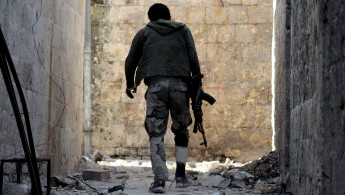Syria's fractured opposition groups patch up their differences
There is a complete news blackout surrounding a planned Syrian opposition conference in Riyadh - but Al-Araby al-Jadeed has obtained information on the meeting.
Sources say that the range of opposition figures invited to the summit is "broad-based", representing a variety of political and military groups - from Islamist to leftist.
Although planning for the meeting is underway, no date has officially been set.
What is known is that the conference will take place before Geneva III peace talks in May.
This should unite the aims and demands of the armed rebel groups inside Syria and the political leadership based abroad.
The Riyadh meeting will be unlike all previous opposition conferences, our sources tell us.
Secret talks
Rebels have gained ground in Syria over the past couple of months, including taking control of the strategically important cities of Idlib and Jisr al-Shughur.
This has sparked a sense of urgency in unifying the myriad rebel groups in control of this territory, and link them to a suitable framework that will bring political gains on a national scale.
Meanwhile, Saudi Arabia is winding down its initial military operation in Yemen. Although it might not be obvious at first, the two situations are closely interlinked.
Speaking on condition of anonymity, a Syrian opposition figure with close links to Riyadh claimed that military intervention in Yemen has helped distract Iran from operations in Syria.
This has allowed the rebels to strike a series of blows against the Syrian regime, which is understood to heavily rely on Tehran's material and military support.
Meanwhile, a regime offensive in south Syria - allegedly with huge backing from Iran - failed to take off.
Negotiations in Geneva are also part of the regime's plan.
During the Geneva II conference, Buthaina Shaaban, adviser to the Syrian president, said that military developments in Syria determined the rhythm of political negotiations.
"The SNC political commission, in its discussions over the past two days, has been inclined to reject [UN envoy to Syria] De Mistura's invitation given its futility and its resemblance to previous conferences in Cairo and Moscow," said one unnamed source.
| We welcome any conference that seeks to bring the views of the Syrian opposition factions closer together. Hisham Marwah, SNC vice-president |
Regime collapse
The source complained that invitations for the conference were sent out to individuals, and not the political bodies they represent.
The goals of the Riyadh conference are reported to include a reaffirmation of the points agreed in the Geneva I communique, and agreement to reject any role for Bashar al-Assad in the ongoing political process.
"We boycotted the Moscow conference because we did not sense any seriousness on the part of the regime and Russia," said Hisham Marwah, vice-president of the SNC.
"We were not invited to the Cairo conference, but we welcome any conference that seeks to bring the views of the Syrian opposition factions closer together."
Two recent events have bolstered the Syrian opposition.
First was an agreement between Saudi Arabia, Turkey and Qatar, while the second was the formation of an Arab military alliance to tackle the spread of the Houthis in Yemen.
Militarily, the capture of Jisr al-Shughur by rebels, which lies just eight kilometres from the Syrian coast, has likely spooked the Syrian regime.
Damascus is also suffering from crippling economic problems, including a freefall of the Syrian pound against the US dollar.
Robert Ford, a former US ambassador to Damascus, believes the end is nigh for the Syrian regime, listing a number of indications that suggest that Baath party rule is in its final days.
Ford cities the military defeats that the regime has recently suffered as examples, along with the collapse of popular support among the Alawite community.
He also used the departure of Hafez Makhlouf, and deaths of Munther al-Assad and Rustom Ghazaleh, as examples of further problems for Damascus.
Efforts to get fresh recruits for the exhausted Syrian army in Damascus and Latakia have also failed.
The once loyal Druze community is also no longer as vocal in their support as it once was.
These are all signs that groups once close to the regime are growing increasingly frustrated with Syria's war and leadership - and are probably what has Damascus most worried.
This article is an edited translation from our Arabic edition.



